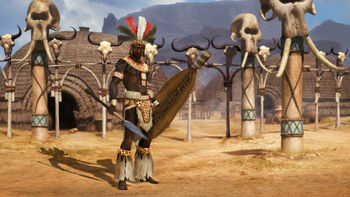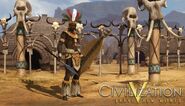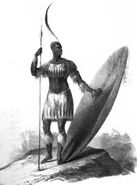Shaka kaSenzangakhona (c. 1787 - c. 22 September 1828), also known as Shaka Zulu, was the most influential leader of the Zulu Kingdom.
In-Game

Shaka in game
Shaka is the leader of the Zulus in Civilization V: Brave New World. He likely speaks isiZulu esijulile, which translates roughly to "deep" isiZulu, in contrast to much of contemporary or "urban" isiZulu, which tends to use a significant number of loanwords from English. The background appears to be a village (likely Ulundi) located in a valley near the Drakensberg mountains, with cattle-bone fences and elephant-skull totems erected around the huts. Shaka is armed with the signature weapons of his people: the oblong cowhide shield and Iklwa, or "assegai," a type of short spear.
Unique Ability: Iklwa
Voice Actor: Khulu Silenjana
AI Traits
| Trait | Amount |
|---|---|
| Competitiveness | 8 (10-6) |
| Wonder Competitiveness | 6 (8-4) |
| City-State Influence Competitiveness | 5 (7-3) |
| Boldness | 8 (10-6) |
| Diplobalance | 4 (6-2) |
| Hate Warmongers | 4 (6-2) |
| Willingness to Denounce | 8 (10-6) |
| Willingness to Declare Friendship | 4 (6-2) |
| Loyalty | 8 (10-6) |
| Neediness | 5 (7-3) |
| Forgiveness | 5 (7-3) |
| Chattiness | 5 (7-3) |
| Meanness | 8 (10-6) |
| Offensive Unit Production | 8 (10-6) |
| Defensive Unit Production | 4 (6-2) |
| Defensive Building Production | 6 (8-4) |
| Military Training Buildings Production | 7 (9-5) |
| Recon Unit Production | 7 (9-5) |
| Ranged Unit Production | 3 (5-1) |
| Mobile Unit Production | 3 (5-1) |
| Naval Unit Production | 3 (5-1) |
| Naval Recon Unit Production | 3 (5-1) |
| Air Unit Production | 6 (8-4) |
| Naval Growth | 5 (7-3) |
| Naval Tile Improvements | 5 (7-3) |
| Water Connections | 4 (6-2) |
| Expansion | 11 (10-9) |
| Growth | 3 (5-1) |
| Tile Improvements | 6 (8-4) |
| Infrastructure (Roads) | 5 (7-3) |
| Production Emphasis | 8 (10-6) |
| Gold Emphasis | 6 (8-4) |
| Science Emphasis | 3 (5-1) |
| Culture Emphasis | 3 (5-1) |
| Happiness Emphasis | 7 (9-5) |
| Great People Emphasis | 3 (5-1) |
| Wonder Emphasis | 3 (5-1) |
| Religion Emphasis | 3 (5-1) |
| Diplomacy Victory | 6 (8-4) |
| Spaceship Victory | 3 (5-1) |
| Nuke Production | 8 (10-6) |
| Use of Nukes | 8 (10-6) |
| Use of Espionage | 5 (7-3) |
| Anti-Air Production | 6 (8-4) |
| Air Carrier Production | 5 (7-3) |
| Land Trade Route Emphasis | 5 (7-3) |
| Sea Trade Route Emphasis | 5 (7-3) |
| Archaeology Emphasis | 5 (7-3) |
| Trade Origin Emphasis | 5 (7-3) |
| Trade Destination Emphasis | 5 (7-3) |
| Airlift Emphasis | 5 (7-3) |
| Likeliness to Declare War | 8 (10-6) |
| Likeliness to be Hostile | 6 (8-4) |
| Likeliness to be Deceptive | 2 (4-1) |
| Likeliness to be Guarded | 5 (7-3) |
| Likeliness to be Afraid | 2 (4-1) |
| Likeliness to be Friendly | 2 (4-1) |
| Likeliness to be Neutral | 4 (6-2) |
| Ignore City-States | 2 (4-1) |
| Friendliness to City-States | 4 (6-2) |
| Protection of City-States | 3 (5-1) |
| Conquest of City-States | 6 (8-4) |
| Bullying of City-States | 8 (10-6) |
Personality and Behavior
Shaka is an aggressive personality and will often try for a domination victory above all others.
Shaka tends to be suspicious of other leaders, though neutral towards fellow warmongers. He will often denounce or declare war on them for perceived slights. However, Shaka is also the most loyal leader in the game, and anyone who succeeds in earning his trust will find him a steadfast ally in the face of mutual foes.
Shaka puts a priority on developing production and raising a strong offensive army consisting primarily of melee units, which are later replaced by gunpowder units. His defensive militia will not be as good, though.
It's also worth noting that Shaka is very likely to get and use nuclear weapons, should he ever get enough research done to discover Atomic Theory.
Shaka frequently bullies city-states, and may also try to conquer them.
The greatest threat from Shaka, apart from outright wars, is his aggressive expansion. He will seek to claim territory as quickly as he can, showing little interest in culture, science, or religion.
Civilopedia Entry
History
"Strike an enemy once and for all. Let him cease to exist as a tribe, or he will live to fly at your throat again." According to the diary of H. F. Fynn, Shaka voiced this edict to his ally Dingiswayo concerning a defeated enemy; even if apocryphal, these words certainly summarize Shaka's philosophy. Bastard son of a tribal chieftain, Shaka kaSenzangahona would oust his half-brother in 1816 AD to claim leadership of the Zulus. He is credited with unifying the Nguni tribes into the Zulu Kingdom. Although called a military genius for his reforms and innovations, he has also been condemned for the brutality of his reign. Whatever the judgement, Shaka laid the foundation for an imposing Zulu state. Upon his assassination in 1828, the Zulu were poised to challenge even the Europeans for control of southern Africa.
Early Life
Although Shaka's life is shrouded in legend and lies, we do know he was the illegitimate son of Senzangakhona, chief of the then-insignificant Zulu tribe, which numbered less than 1500 people. Shaka's mother, Nandi, was the daughter of a deceased chieftain of the Langeni. Despite his attempts to deny paternity, Senzangakhona would eventually marry Nandi, installing her as his third wife. But the relationship was troubled, and the Zulu chieftain would exile Nandi and Shaka. The two wandered until 1803 AD, when they found haven with the Mtetwa and their chief Dingiswayo.
Under Dingiswayo's patronage, Shaka grew into a tall, imposing young warrior, imbued with courage and daring. At the age of 23, Shaka was given command of a regiment in Dingiswayo's army. His deeds and stature brought him a rapid rise in the army, and Shaka became one of the chief's foremost commanders. Shaka rearmed his units, discarding the light throwing spear the Mtetwa favored for a broad-bladed stabbing spear (the famed assagai) and a large, cowhide-covered shield.
On the death of Shaka's father around 1816 AD, Dingiswayo lent his protege the military support necessary to oust and assassinate his half-brother Sigujana and establish himself as chieftain of the Zulu. The coup was relatively bloodless, and the Zulu accepted Shaka without reservation. Shaka pledged himself a vassal of the Mtetwa. As the chieftain's favorite, Shaka was granted unusual latitude in expanding his holdings through conquering and assimilating neighbouring tribes. By 1817, Shaka could command a force of 2000 warriors, and had assured his position as the first of Dingiswayo's vassals.
Reign
According to legend, in Dingiswayo's last battle against Zwide of the Ndwandwe, Shaka purposely delayed the arrival of his forces until Dingiswayo had been defeated and killed, keeping his own forces intact. Stepping into the power vacuum, Shaka began conquering and assimilating small neighbouring tribes with brutal efficiency. Within a few years the Qwabe, Hlubi, and Mkhize were added to the Zulu empire; through diplomacy and patronage, Shaka brought the Sithole and Thuli under his command. By 1824, Shaka had an army of 20,000 warriors, trained in his manner of tactics and strategy.
Concerned by the growing Zulu power, Zwide moved against Shaka. The first Ndwandwe invasion was defeated at Gqokoli Hill by superior tactics and Shaka's defensive strategy. In 1819 AD, Zwide sent a second expedition into the Zulu lands. Retreating steadily, Shaka lured the massed enemy deep into his own territory, until at the Mhlathuze River, Shaka flung his regiments at the exhausted Ndwandwe and their allies. The outcome was a decisive defeat for the invaders in a two-day running battle, and the Ndwandwe, Jere, Maseko, and Msene tribes were virtually annihilated.
By the time the first white traders reached the southeastern African coast in 1824, Shaka was in control of an empire which spanned the entire coast and reached far inland. Shaka accorded the white traders favored treatment, ceded them land, and allowed the building of a trading post at Port Natal. Alert to the trade advantages, curious about their technology and culture, Shaka insured there were no serious conflicts between the Zulu and the Europeans.
Assassination
By 1828, Shaka was an undisputed despot, but his frequent cruelties and unstable behavior were eroding the loyalties of his people. With the death of his mother in October 1827, Shaka dispatched his royal regiments to force the surrounding tribal chieftains to grieve. Taking advantage of the absence of his loyal troops, in September 1828 his personal bodyguard Mbopha and his half-brothers Dingane and Mhlangana stabbed Shaka to death near the Ikanda at Dukuza. Shaka's body was dumped into an empty grain pit, which was then filled with rocks and mud; the exact site has never been conclusively identified.
Judgement of History
By the time of his death, Shaka ruled a vast territory in southeastern Africa, was absolute ruler over 250,000 subjects, and could field an army of 40,000 experienced warriors. In the process of amassing his empire, it is estimated that 2 million people had died. Although his kingdom lasted less than 80 years, Shaka nevertheless cast a large shadow over Africa's history. Today, Shaka is revered as the leader who gave birth to the Zulu spirit that allowed them to persevere under apartheid and to the Nationalism that shaped modern South Africa.
Trivia
Originally produced in apartheid South Africa, the 1986 ten-episode mini-series "Shaka Zulu" later aired in syndication in Europe and the United States; its popularity sparked a worldwide interest in the life and accomplishments of the first Zulu king.
Lines
Attacked: Uwazi (You know it) "palamisei" wakho (your), kuzo (it will) wenze (you do) "wafuwubli."
[Note: Compare with the XML line "Your arrogance will only lead you to defeat!"]
Declares War: "A gei" kho (none) "ossos vimba" ngisho (I say) nawe (even you) bala! (actually/absolutely/certainly/indeed/really/truly) "Aiveeveh!"
[Note: Compare with the XML line "None will slow our progress, not even you! Prepare for war!"]
Defeated: Amabutho ami (My warriors), "afulu lei gii, ganti nani ungil way zala pontz."
[Note: The translation of everything after the first part of the phrase is unclear. The XML line - "My warriors have failed, and so I failed them." - is the probable meaning.]
Hate Hello: You say? What are you doing here? (Usho? Wenzani lapha?)
Hate Let's Hear It 01: Speak! (Khuluma!)
Hate Let's Hear It 02: "Ini gei" manje. (Manje means "now," and –ni is "what.")
Hate Let's Hear It 03: You also/too! (Wena futhi!)
Hate No 01: Don't be impudent! (Musa ganga!)
Hate No 02: I didn't hear. (Angazwanga.)
Hate No 03: ?
Hate Yes 01: Alright! (Kulungile!)
Hate Yes 02: ?
Hate Yes 03: ?
Intro: I'm Shaka of Zulu. Don't try to move, warrior, or I'll destroy you. (Mina nging-uShaka wa kwaZulu, ingenzi zama butho. Ngokusa ubafana yonawe.)
Neutral Hello: Hail your Majesty! (Bayethe!)
Neutral Let's Hear It 01: It puts?? (Kubeka.)
Neutral Let's Hear It 02: Here it is a rowboat. (Nansi khebe.)
[Note: The meaning of this phrase is unclear; it is most likely an idiom.]
Neutral Let's Hear It 03: I'm listening. (Uwuzwa-su.)
Neutral No 01: No! (Qha!)
Neutral No 02: Not a bit. (Lutho neze neze.)
Neutral No 03: Try again, chicken! (Linga chosso izinkukhu!)
Neutral Yes 01: Alright! (Kulungile!)
Neutral Yes 02: Share it with us. (Ingabe-na.)
Neutral Yes 03: I accept. (Ingavuma.)
Peaceful: ?
Request: Approve the closure sell. (Ungavuma-wuphe dayisa.)
[Note: He could be trying to say, "You might accept this offer."]
Intro
Your people kneel before you, great warrior Shaka of the Zulu Kingdom. As you rose from a place of exile to become the true leader of the Zulus, you ushered in changes throughout the Zulu society, implementing new laws and cultural reforms that strengthened the position of your kingdom. However, it was your tenacity in the art of war that truly established your reputation, as your tactics and strategies on the battlefield forever changed the face of combat across the plains of southern Africa.
Most formidable king, your people once again long for the unity and strength your leadership afforded them. Can you return the Zulu kingdom to such great prominence? Will you build a civilization that stands the test of time?



